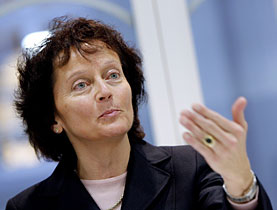Cabinet “can get by” without Blocher

The Swiss papers are generally optimistic about the election of Eveline Widmer-Schlumpf to the cabinet, replacing controversial People's Party colleague Christoph Blocher.
But while they welcome the return of collegiality, there is a concern that the government is at the beginning of a period of political uncertainty.
On Thursday, Widmer-Schlumpf, viewed as a more moderate choice than Blocher, was sworn in as a member of the country’s seven-person cabinet. Her party immediately announced it was pulling out of the four-party government in protest at the exclusion of Blocher, who failed to win re-election on Wednesday.
On the whole, the press in Swiss-German regions seem more upbeat than papers in other language regions about the consequences of the political upset.
On first appearances, the Swiss government look “capable of getting along”, wrote the Neue Zürcher Zeitung. “There is no guarantee that the cabinet is unified, but it is a good starting point for sustainable work in government – the renewal must continue.”
The influence of the People’s Party in opposition could well decline in the medium term, warned the Zurich-based newspaper, a position supported by the Tages-Anzeiger.
The Südostschweiz newspaper is also not convinced the People’s Party will succeed in opposition, but it foresees “tough fights” ahead during future parliamentary debates.
“It will also be alright without Blocher,” wrote the Tages-Anzeiger. “He was both a member of government and already head of the party and the opposition.”
For the Zurich-based paper, “his surprising failure to be re-elected does not fundamentally change the political landscape” and the withdrawal of the People’s Party opens a transitional phase until the party becomes less “centred on Blocher” and able to renew its responsibilities at the national level.
In the same spirit, the Bund reminded its readers of a recent survey of the seven cabinet members, which placed Blocher, despite his party’s 29 per cent electoral support, “in sixth place”.
The Basler Zeitung praised Widmer-Schlumpf and hoped that she, together with the other cabinet members who were all re-elected on Wednesday, would fully assume their responsibilities.
“The woman has courage. She said yes to the post, despite the treatment from those at the top of the People’s Party and despite the threats from hardliners to put a lot of pressure on her in opposition over the next few years,” commented the Blick tabloid.
Political realignment
Several papers analyse in detail the consequences of the major political realignment, with the People’s Party in opposition and the necessary repositioning of the other political parties, in particular the Christian Democrats and the Radical Party.
The French-language Le Matin wondered what the new political landscape would be like with Blocher and his party in opposition. It is the first time in the history of Swiss politics that a former cabinet member finds himself in this situation.
“Should we be scared?” it asked. “Will Blocher and his party be weakened by this slap in the face and what political weight does Blocher still hold?”
“There are bound to be reprisals. It will seem a bit like a jungle… the political culture will change,” it argued. “You don’t hurt a ferocious lion like Blocher and expect to get away with it.”
But even “kicked into touch”, the “old tomcat” will show his claws, noted the French-speaking 24heures newspaper.
Despite his obvious disappointment, Christoph Blocher returns to his former role – that of a powerful orator – to which he is best suited, wrote the Geneva-based Le Temps.
“Christoph Blocher gives the impression of having life before him after having escaped from prison. The fact is, though, he was kicked out,” it commented.
Le Temps also highlighted the fact that women now hold three of the seven cabinet seats – the highest ever share.
“The new arrival, 52 years old, a mother of three young adults, adds a touch of youth to a cabinet where there are five people over 60,” it added, making Widmer-Schlumpf one year older than she actually is.
“Uncertain territory”
The shock waves reached front pages all around the world.
The defeat for Blocher changed the rules of a normally staid and predictable political culture, said The Guardian in London.
It added that the result was a “coup that plunged Swiss politics into uncertain territory”.
The International Herald Tribune also saw a “period of uncertainty in the previously predictable world of Swiss politics” and quoted an analyst who said Blocher may gain popular appeal as a victim of secret party machinations to eject him from the cabinet.
London’s Financial Times warned that the People’s Party’s promise to exploit Switzerland’s referendum-based democracy to challenge any legislation it found unacceptable “could complicate attempts to deepen relations with the European Union or to dilute the harsh anti-immigrant measures pushed through by Mr Blocher in his four years as justice minister”.
The FT quoted analysts who said recent developments had taken Switzerland closer to an Anglo-Saxon, adversarial style of politics.
swissinfo, Simon Bradley
The four main political parties have been represented in the seven-member Swiss government for nearly 50 years.
The party-political make up remained unchanged between 1959 and 2003, when Christoph Blocher won a second seat for his party at the expense of the centre-right Christian Democrats.
The four main parties have an 80% majority in parliament, while the Greens are the largest opposition party with around 10%.
Over the past 15 years the People’s Party has gradually increased its share of the vote to 29% in October’s parliamentary elections.
Christoph Blocher is only the fourth cabinet minister in Swiss history to fail to win re-election.
Usually it’s up to a cabinet minister to choose the moment to step down. Ministers are elected for a four-year term by parliament.
Eveline Widmer-Schlumpf is the third woman in the cabinet, joining Foreign Minister Micheline Calmy-Rey and Economics Minister Doris Leuthard.
Cabinet portfolios will be distributed after a meeting next week.
Parliament elected Interior Minister Pascal Couchepin as Swiss president for 2008 – a rotating and largely ceremonial post.

In compliance with the JTI standards
More: SWI swissinfo.ch certified by the Journalism Trust Initiative












You can find an overview of ongoing debates with our journalists here . Please join us!
If you want to start a conversation about a topic raised in this article or want to report factual errors, email us at english@swissinfo.ch.